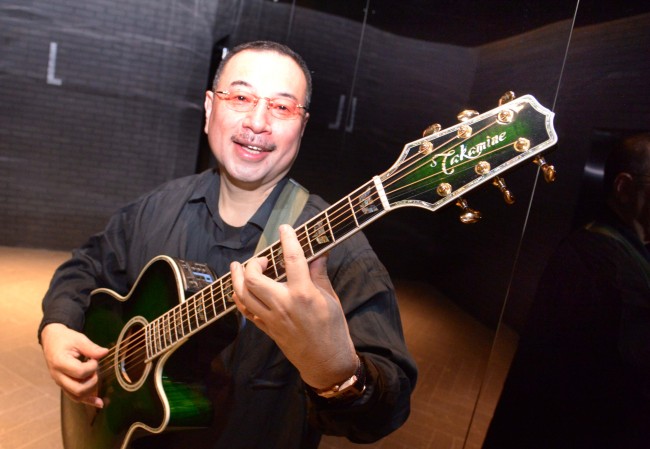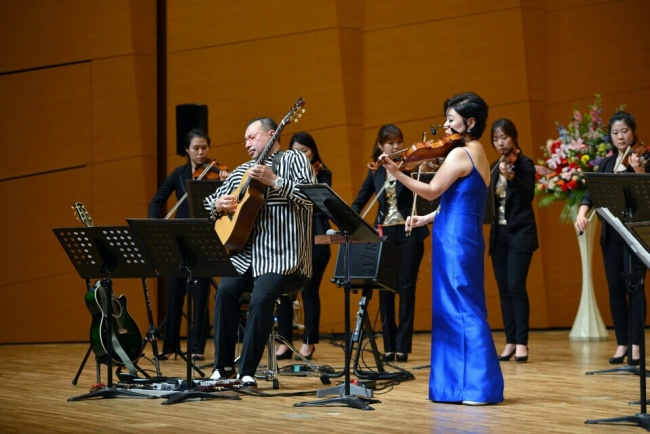 |
Guitarist Jiro Yoshida poses with his signature Takamine electric guitar on July 7. (Chung Hee-cho/ The Korea Herald) |
Giving me a copy of his most recent CD, guitarist Jiro Yoshida explained that it uses a high-resolution audio CD format that yields more dynamic sound when played on a special CD player.
“It took six months to record because we needed to find just the right setting for this format. For example, the instruments had to be 2 meters away from the microphones,” said Yoshida, who was in Seoul earlier this month for a performance with Korean jazz vocalist Woongsan.
Listening to the CD, “A Pastel Shade,” during the hourlong drives home from work on the regular car audio system, I may not be getting the full sound experience, but the music I hear is soothing, the crystal clear plucking of the strings easing the jagged nerves.
Yoshida’s music is grounded in his classical music training that is discernable in many of the tracks in “A Pastel Shade.” He just received his Ph.D. in history of music from the Manhattan School of Music after 14 years. His dissertation topic? As improbable as it sounds for a jazz musician, he wrote his doctoral dissertation on Gregorian chant notations. He also holds a master’s degree from the Berklee College of Music in Boston where he studied musical composition and orchestration.
Perhaps Yoshida did not know what the future held for him ― he would go on to become an internationally acclaimed guitarist, composer and producer ― when he enrolled in the Ph.D. program all those years ago. “I am now very busy producing in Japan, the U.S. and Europe. Now, it would be very sad to teach,” said the Japanese-born Yoshida, who has been working in the U.S. for 32 years.
Yoshida did not plan on staying in New York.
“I just wanted to check out the scene,” he said.
In 1989, he recalled, many musicians moved to producing music and as a young musician, Yoshida had the chance to play in sessions every day. Over the next 25 years, he went on to record, perform and produce more than 10,000 pieces.
 |
Jiro Yoshida (left) performs with violinist Lee Sung-ju (right) and Joy of Strings in Kobe, Japan, on May 16. (Joy of Strings) |
Yoshida has also written music for National Geographic documentaries and soundtracks for some 40 films, two of which were nominated for a Grammy. Currently, he is writing the music score for “I Remember You,” a Richard Dreyfuss movie being shot in Hollywood.
Yoshida has a special connection with Korea through his father who spoke fluent Korean and collected Korean art, even publishing a book about it.
“My dad wanted me to do something in culture and I picked the piano,” he said. “Classical piano lessons were very depressing for the young in the 1960s and I wanted something more masculine,” Yoshida said. After he saw an electric guitar band on television, Yoshida told his mother that he wanted to play that guitar. Switch to guitar he did, but to a classical guitar.
A Miles Davis concert in Shinjuku in 1981 changed Yoshida’s life. “It was a comeback concert after a 10-year break. I was very impressed with Miles Davis’ new band. It was creative, sensational,” he said. “’This is it,’ I thought and said, ‘This is what I would love to do,’” Yoshida said. He had no idea how to go about it, however, even though he could imitate different musicians up to a point.
By this time, Yoshida, who was a law student at Waseda University, was already a sought-after professional jazz musician. The young boy had won a national classical music competition at 14, and was told to go to Spain to study classical guitar by his mother and his teacher, had made a secret deal with his father to allow him to pursue jazz on the condition he go to university.
Yoshida was a self-taught jazz musician, reading imported books on jazz and listening to whatever was available. Eventually, he went onto Berklee College of Music, where he was shocked by the teaching method. “I was told to play from instinct, experience,” he said.
Yoshida plays a wide range of musical styles ― electric, folk, jazz and classical, as well as heavy metal ― with emphasis on improvisation. “I am often labeled a jazz guitarist, but I don’t like that. I am just a guitarist,” he said. As a composer, he is influenced by classical musicians such as Stravinsky, Bartok, Schumann, Prokofiev, Tchaikovsky and Ravel.
Of his numerous compositions, Yoshida counts “Snow Dance,” which will be the main theme for the film “I Remember You,” as his favorite. This piece will also be performed during the Aug. 10 concert at the Seoul Arts Center with classical ensemble Joy of Strings led by acclaimed violinist Lee Sung-ju. “It is a very emotional piece. My career started as a classical guitarist and this piece has a big part for classical guitar,” he said.
In fact, the two already performed together in May in Kobe, Japan, where they received a standing ovation, according to Yoshida.
“My music is very difficult with lots of fast passages but they handled it very well,” he said about the Joy of Strings. “The August concert will have jazz flavor music performed by classical musicians,” he said.
Noting that Korean musicians’ training is very solid and even classical musicians are very open-minded, Yoshida said, “People should pay more attention to the quality of music by Korean musicians, classical and jazz.”
By Kim Hoo-ran
(
khooran@heraldcorpcom)









